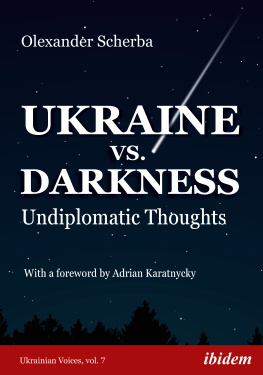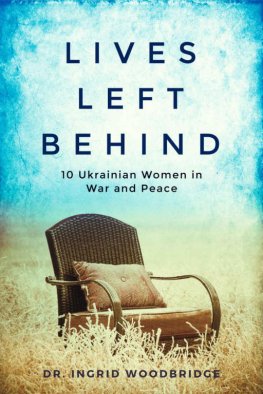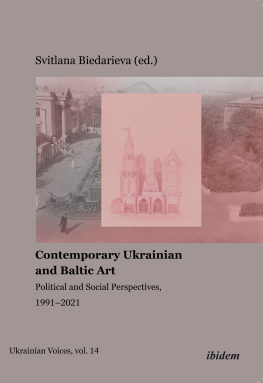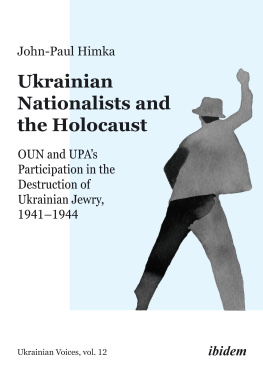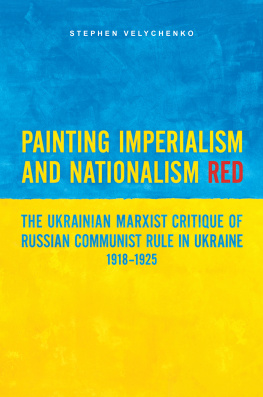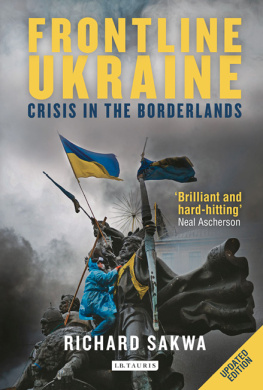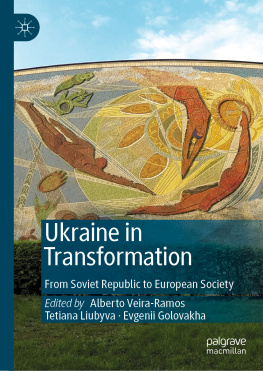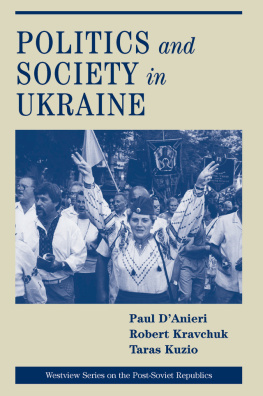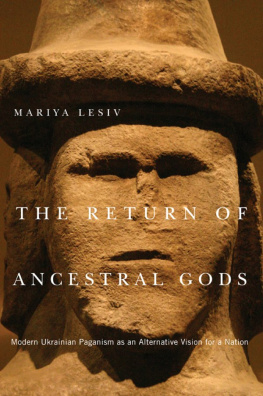ibidem -Press, Stuttgart
If you really want to make sense of what is happening in Ukraine today, and how Europe views what is going on in Ukraine, read this book.
Ivan Krastev, author of "Democracy Disrupted" and "After Europe"
A government insiders gripping and incisive look at Ukraine and its war with Russia. Essential for anyone who wants to understand this poorly known country, whose fate is pivotal for the future of Europe and the global balance of power.
Peter Pomerantsev, author of "Nothing Is True and Everything Is Possible" and "This Is Not Propaganda"
From one of Ukraines leading diplomats, these unvarnished undiplomatic thoughts are deeply personal reflections on a country on the front lines of liberal democracys civilizational battle against kleptocratic authoritarianism. Scherba expertly deconstructs myths about Ukraine, as well as Russian motives in his country, eloquently voicing its peoples aspirations to determine their own future by escaping the Kremlins shadow and becoming a full-fledged European country.
Gregory Feifer, author of "Russians" and "The Great Gamble"
Ambassador Olexander Scherbas book is an excellent and instructive example of how patriotism can draw upon the foundations of Christian humanism while avoiding the trap of nationalism.
Anton Shekhovtsov, author of "Russia and the Western Far Right: Tango Noir"
In his book, Olexander Scherba avoids the usual stereotypes of a diplomat as a frozen bureaucrat and of a post-Soviet Ukrainian having difficulty speaking to the world. He himself is proof of Ukraines fight against darkness.
Myroslav Marynovych, vice-rector of Ukrainian Catholic University in Lviv
Contents
Foreword
by Adrian Karatnycky
Ambassador Olexander Scherbas book of essays is an important means by which to understand the nature of Ukraines struggle for sovereignty. It is a window into Russian hybrid war. And it is a thoughtful look at Ukraines frequently arcane and always complex politics, in which the Russian factor and Russian fifth columns loom large.
From his vantage point of diplomatic service in Vienna, as well as his past service in Bonn, Berlin and Washington, Scherba is a sophisticated and congenial guide to Ukraine and its crucial place in the complex geopolitics of East Central Europe. In a fair-minded and illuminating fashion, he discusses the phenomena of civil society, of religion, of nationalism, and of reform in his own country. He takes on major issues and challenges in international affairs, including Russian imperialism, hybrid war, and the future of Europe.
He is equally an intelligent guide to broader geo-political trends in a number of countries that like Ukraine are on the frontlines of the struggle between democracy and tyranny, between light and darkness.
Scherba has blazed an impressive trail of excellence as a diplomat in Austria, a country with a noble diplomatic tradition, one that includes the towering figures, such as Prince Klemens von Metternich. As a former imperial center, Austria is a crucible for important thinking about complex geopolitics. During his years of service in Vienna, Ambassador Scherba has shown in his commentaries that he can play in this intellectual Premier League.
They are the byproduct of the writers diplomatic mission in Austria, which has been by an active public presence in the Austrian media, from television to the countrys top news periodicals and intellectual journals. He also has been at the center, as well of energetic efforts to promote modern Ukraines cinema, theatre and music, thus reminding Austrians of the European nature of Ukraines cultural and intellectual life.
Many of these essays are also part of Ambassador Scherbas effort to borrow from his diplomatic encounter with Central Europe to also speak directly to the Ukrainian people and its elite.
Taken together, this collection of essays demonstrates in intelligent and engaging fashion how central is the fate of Ukraine to the future of Europe, and indeed to the identity of Europe as a community of democratic values.
In reading these lively texts, readers hear the voice of a spirited defender of the liberal values that are now present both within significant portions of the Ukrainian population and within much of its post-Communist elite.
This volume and the high quality of thinking are a tribute to Ambassador Scherbas talents as a writer and thinker. But the volume is also a product of the unique, indeed, remarkable institution: Ukraines Ministry of Foreign Affairs.
In 1991, when Ukraine won its independence, many of the new states structures emerged damaged and deformedincluding the judicial, police, administrative, media and cultural sectors.
Not so, with the Foreign Ministry, which in large measure had to be created ex nihilo. As such it needed to quickly populate itself not only with cynical Soviet-era diplomats, but with a new generation of foreign policy experts. This generation of new hires, to which Ambassador Scherba belongs, were unencumbered by the ossified traditions and lies of the Soviet era. As a result, the Foreign Ministry quickly developed an internal culture of expertise, excellence, and patriotism, which has sustained it despite the ebbs and flows of Ukraines post-Soviet political scene.
Like many of his counterparts, Ambassador Scherba benefited from coming to his political adulthood in an independent, nascent Ukrainian democracyfull of promise and challenges. Like many of his counterparts, he also had the advantage of the impressive and rigorous training offered diplomats at the Kyivs Shevchenko State University Institute of International Relations.
Read these essays and you will understand why Ukraines Foreign Ministry has been one of the main pillars of the countrys independence. Read these essays and you will also be convinced that Ukraine belongs in the European family of nations. Read these essays and you will understand that the Ukrainian state is filled with able, intellectual, insightful, and cultured officials who have emerged in the decades since the USSRs collapse. And read these essays to shine a light on where there has been the darkness of ignorance and disinformation.
ADRIAN KARATNYCKY, the author of several books and editor of numerous collected volumes on the Soviet and post-Soviet space, is the Former President of the U.S.-based, international democracy advocacy organization Freedom House. He is the Senior Fellow at the Atlantic Council of the U.S., where he is co-director and founder of its Ukraine in Europe program.
I know your deeds,
that you are neither cold nor hot.
I wish you were either
one or the other! .
Revelations 15:3
We Will Never Be Slaves!
Let me introduce myself. Im a 50-year-old Ukrainian diplomat currently completing my tenure as a Ukrainian ambassador in Austria. My first nameOlexander (Alexander)is the most popular in the post-Soviet space. My last nameScherbahas to do with the Orthodox Serbs who fled the Ottoman Empire and found their new home in Ukraine, which was back then a part of Southern Russia and Eastern Poland. My parents were the first ones in the family to finish university. Other than that, my heritage is Ukrainian peasantsfor as far back as the eye can see. Maybe thats why I always keep forgetting to water my plants.
Ukraine is the historical crossroads of Europes East. Youll find all kinds of villages in Ukrainian countryside: Russian, Crimean Tatar, Swedish, Bulgarian, Albanian, Turkish. All mixed together, knit in one big patchwork called Ukraine. Its a country where at every step, you meet people either bilingual (Ukrainian/Russian) or even trilingual (Ukrainian/Russian + a language of a neighboring country, be it Poland, Hungary, or Bulgaria). Ukraine also used to have a large Jewish community, which, unfortunately, grew considerably smaller after the fall of the Soviet Union. What you saw in Fiddler on the Roof was Ukraine, not Russia.

